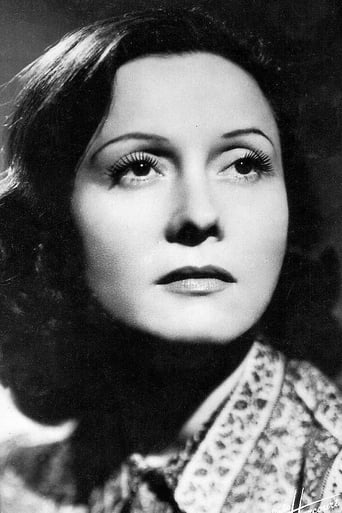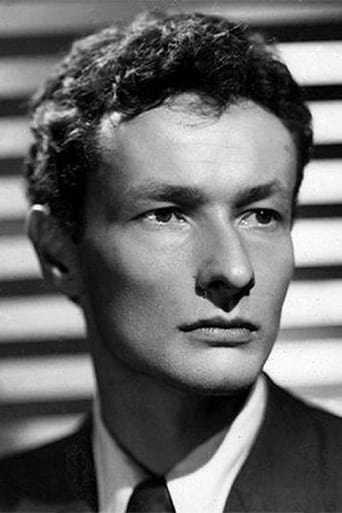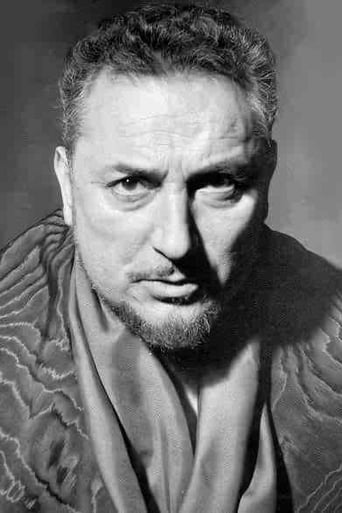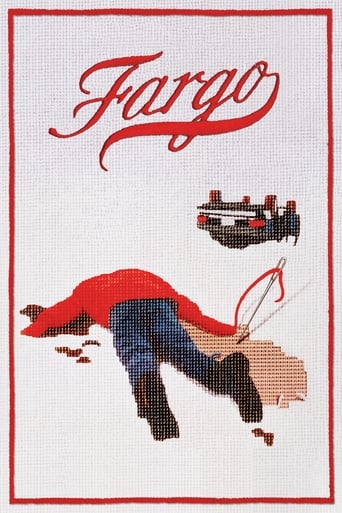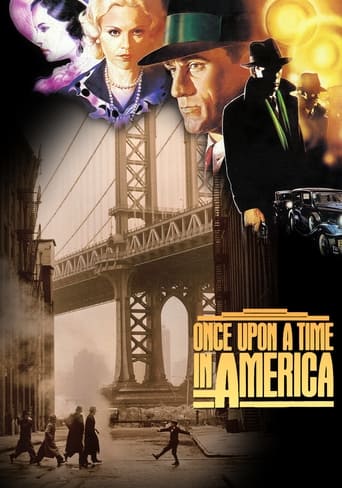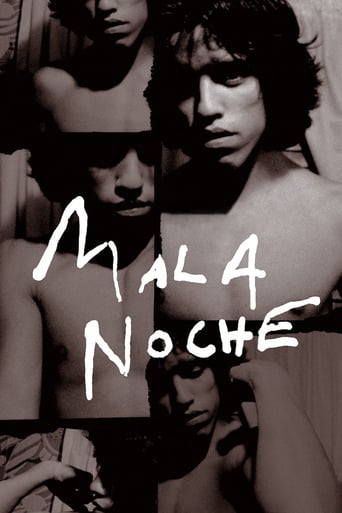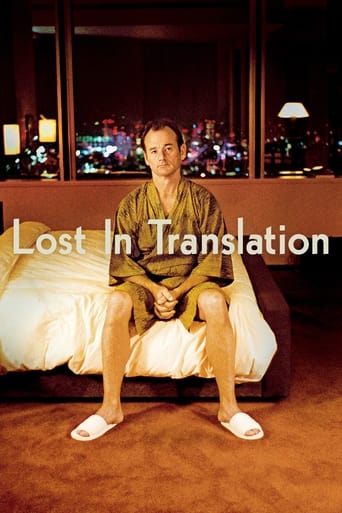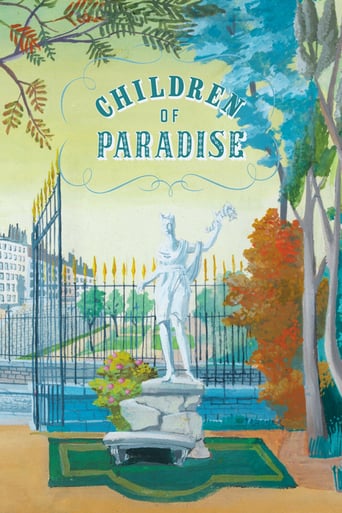
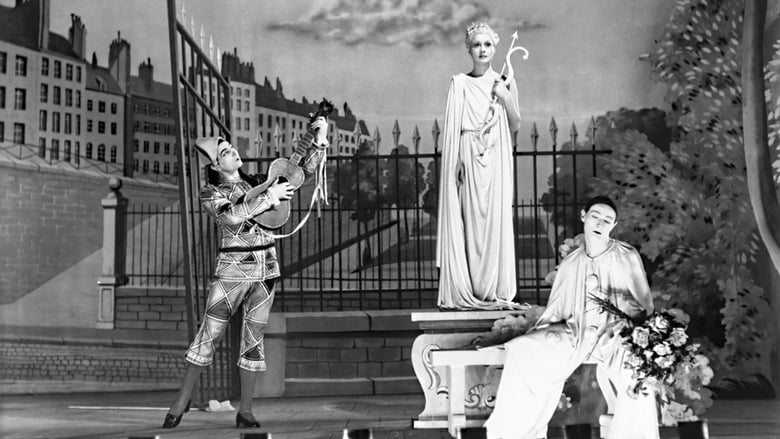
Children of Paradise (1946)
In a chaotic 19th-century Paris teeming with aristocrats, thieves, psychics, and courtesans, theater mime Baptiste is in love with the mysterious actress Garance. But Garance, in turn, is loved by three other men: pretentious actor Frederick, conniving thief Lacenaire, and Count Edouard of Montray.
Watch Trailer
Cast


Similar titles
Reviews
The movie opens and closes with a most festive carnival atmosphere, with mimes and clowns prancing their wares to an enthusiastic street crowd. Amid the rabble of 1920's Paris, a somewhat aristocratic looking woman becomes the romantic target for four disparate men, some with love in mind, and some with, well, that which goes with the territory. The story takes place over two long chapters titled 'The Boulevard of Crime' and 'The Man in White', and there was a bit of a disconnect for me in that the second part took place 'several years' after the introduction of the principal players. Perhaps that was necessary to establish that one of Claire Reine/the Lady Garance's (Arletty) principal suitors, the mime artist Baptiste (Jean-Louis Barrault) wound up in marriage to Nathalie (María Casares) and was raising a son with her. For whatever reason, Garance never terminated the relationships with her remaining three paramours, who remained in her orbit and often crossed paths with each other while harboring conflicting emotions.Though the picture managed to maintain my interest, I can't honestly say that this might have been the greatest French film ever, or as some reviewers here state, THE greatest movie of all time. Certainly director Marcel Carné created a lively and vivid period film under harsh wartime conditions while France was occupied by Nazis during World War II. It always strikes me as significant that actors and actresses can compartmentalize their emotions during times of stress to produce their particular form of art. Taking nothing away from devotees of the picture, I thought it was generally a good film but far from the 'greatest' label. With that said, I thought each of the principals did a competent job with their portrayals, particularly Jean-Louis Barrault during his mime sequences. I was somewhat puzzled over the choice of actress Arletty as the object of desire for her four would be lovers, as she didn't strike me as stunningly beautiful per se, though there was a classic grace to her personality. Most disconcerting for this viewer was how easily Baptiste managed to cast off concern for his wife when she caught the two of them in a romantic embrace. One wonders exactly what he would do about her if he managed to track down Garance in that vast sea of clowns and revelers as the story came to a close.
Children of Paradise (1945) is a masterpiece. There is no denying that. There is no discussion: this film is one of the finest examples of cinema as a storytelling form.Much has already been made of the film's troubled production and the WWII allegory, so I won't go into that here. I just want to discuss how it works as a movie. It is that rare film which is theatrical without feeling phony or "stagey" as some would call it. The characters are able to feel both larger than life and thoroughly, painfully real. Every actor is great and there is not a bad performance in the bunch. Though Carne is dealing with the colorful world of 19th century theater, the black and white film is perfect in projecting a dreamlike ambiance and a bittersweet sense of romance.Though the love square plot might make you believe this is some trite melodrama, let me assure you it absolutely is not that at all. This is a movie which examines lost chances, lost loves. It mourns the passage of time, especially when someone settles for less than what they truly want. The heart of Children of Paradise possesses a piercing, aching melancholy, one you will not be able to shake for hours on end after you watch it.
Yes, I know this movie is considered by many to be one of the finest ever made. Nor do I have any intention of questioning its quality as film art.But I did not enjoy it.Yes, the scenes in the Théâtre des funambules on stage are magical. J. L. Barrault is wonderful as the mime. It's only when he speaks, in a highly theatrical and unnatural fashion, that I wanted to turn the sound off.And yes, I realize that this movie is about actors, and that the theme of reality vs. artificiality is big. But that conceit wears out quickly for me, and too often I was reminded of Blue Angel and the strange actors in that movie. Portraying the theater as a world of weirdos doesn't hold my attention for long. I just could not get caught up in this story.And then the end! I checked twice to make sure that my DVD player hadn't missed a segment. No, I don't expect a movie to wrap up all the loose ends. But this movie just stops. Everyone's life is ruined, true, so what's left to do? I don't know, but I would have liked at least a little sense of resolution with at least one theme.I'll take Le jour se lève or Quai des brumes any day over this. It really did not hold me.
From the book 1001 Movies You Must See Before You Die this was a distinctive title for a French film, and while watching it I remembered the most memorable scene shown in the documentary The Story of Film: an Odyssey, so there was good reason to watch it. Basically actress and woman-about-town Claire Reine, who calls herself Garance (Arletty) has numerous men falling at her feet and in love with her, including the significant ill-fated relationship with theatre mime Jean-Baptiste Debureau (Jean-Louis Barrault), and also pretentious actor Frédérick Lemaîtr (Pierre Brasseur), conniving thief Pierre François Lacenaire (Marcel Herrand) and Count Eduard of Montray (Louis Salou). Baptiste has his own dilemma as well, as actress Nathalie (María Casarès) is in love with him, it was when Garance was accused of stealing a watch that she and he met, and Count Eduard protects her when she may have been arrested for the crime of Lacenaire. Years of separation for them, the real loving couple end up in relationships with the people they do not truly love, Baptiste with Nathalie who have a baby son together and goes on to become famous for his mime acting, and Garance with the Count and wants to find her true lover again. The couple do manage to spend a night together, even after Nathalie's attempt to sabotage their meeting by sending her child to foil it, while Count Eduard is discovered murdered, he was killed by Lacenaire. In the end Baptiste is separated from his love again after disappearing in the crowd who are running to escape an attack, and Garrance is forced to leave town in a carriage, completely oblivious to the fact that the Count is dead. Also starring Pierre Renoir as Jéricho the old clothes, Etienne Decroux as Anselme Debureau and Fabien Loris as Avril – Lacenaire's assistant. The acting, particularly from Arletty as the woman caught in a web of relationships and Barrault as the actor who is brilliantly expressive and funny with his silent act, I will confess that it was hard to follow all of what was going on, but that memorable scene of the comedy mime actor describing in silence the mistaken theft of the watch is fantastic, and there are other good moments, overall it is elegant classic period drama. It was nominated the Oscar for Best Writing, Original Screenplay. Very good!


